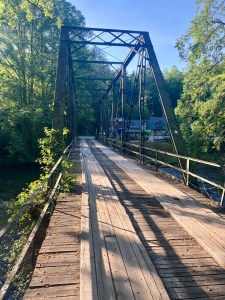Walking to the Smoky Mountains, Day 9, June 6
Lost Creek tent site-Coker Creek campsite 16.6 miles
By far the most difficult day. It rained hard in the night and everything was wet, as was the trail. So even though the opening parts were easy flat walking, my feet were soon soaking and some blisters that had been bothering me blew up. The first few miles were on an old, overgrown railroad grade full of flowers and following a stream. I kept getting a whiff of cucumbers, which reminded me of the old story that pigs don’t eat cucumbers because that’s what snakes smell like. I question the veracity of that tale, but paid attention when the smell returned, looking for either a plant that smelled like salad or a serpent in the grass. Because of my early start I missed going to Webb’s store in Reliance—the town’s post office and all-around general store though I got to see the historic Hiawassee Meeting House in the early morning while the mist rose up from the river. I also took a half mile detour to eat breakfast at Reliance Fly and Tackle—another must-see fishing store with resupply and hot food— a couple of biscuits later I was heading back down the hill for a day that pretty much followed the
Hiawassee upstream. The river, which is also controlled by the TVA is a popular rafting and kayaking spot. Later in the day the trail wound up on some ridges above the river with large ledge rock overhangs. There I saw my first copperhead of the trip, and then realized the trail was a snake hunter’s dream, and so I proceeded with caution. Sore feet slowed my pace, but arriving in camp there was a little sun (but not enough to dry things out). To cap it all off, a semi-swarm of honey bees descended on my sweaty clothes and the outside of my tent. After getting stung, I had to zip in and wait until dark for them to leave. And of course, like any dinner party, two just kept hanging around.


















